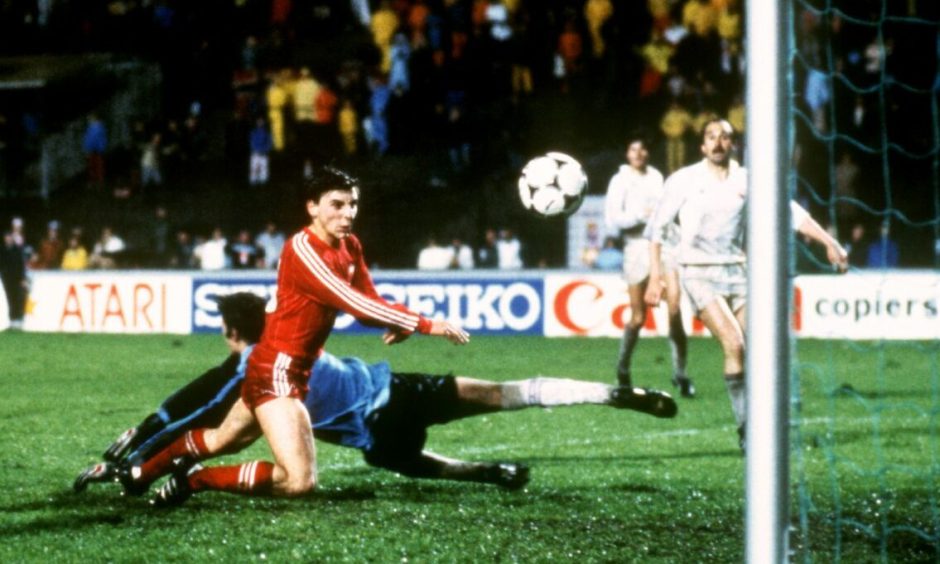
John Hewitt says he has not stopped to think how his life might have been different had he not scored the most iconic and important goal in Aberdeen’s history.
On May 11, 1983, at a rain-soaked Ullevi Stadium in Gothenburg, Sweden, in the 21st minute of extra-time, Hewitt kept his eyes locked on Mark McGhee’s left-flank cross and thumped a back-post diving header into the unguarded Real Madrid net to make it 2-1 and secure European Cup Winners’ Cup glory for the Dons.
“If I hadn’t scored the goal, would we have won the game? Would somebody else have scored? Would we have lost the game?” Hewitt said.
“These are questions that didn’t matter, because we did – I scored the goal and we won the game.”
Still, Hewitt knows he would have “never heard the end of it” if, with Real keeper Agustín stretching in vain for the cross as it made its way to the Dons striker, he hadn’t taken the chance to score the goal which has come to define Aberdeen’s golden era, as well as his own playing career.
Recalling the moments in the build-up like they were four minutes, rather than four decades ago, he said: “The goal itself all stemmed from the left-back area, where Peter (Weir)’s beat four or five players and he’s clipped the ball up the left wing. Mark (McGhee)’s spun out, got the ball.
“With Mark, you were never sure if he’d beat the guy, then double back and beat him again.
“So I was running in on goal, I could see the goal, I could see Mark in the wide area. But I was always conscious about whether he was going to cross it early or double back.
“I was there, I was there, I was there.
“The only thing I found quite alarming is there were no defenders with me.
“I was bearing down in on goal myself, and there was Mark – this time he took the ball to the side of the full-back and whipped in the cross.
“That was the moment for me to make my move.
“The goalkeeper was rooted on his line, which I thought was strange, and by the time he decided to come out to try to get the ball, I knew he wasn’t getting it.
“I’m boring in on him, and I see the flight of the ball.
“I’m thinking: ‘He’s not getting this’, and I just needed to make sure I headed it into an empty goal.
“I keep saying to people: ‘it was pretty straightforward’, but if I’d missed that I’d never have heard the end of it.”
Hewitt’s celebration – a picture of pure elation and pure confusion as to what to do next – is almost as famous as the goal.
“I picked myself up, wiped my hands on shirt, and then the next second Big Dougie (Rougvie) wrestled me to the ground, and that was it,” he added.
‘Effing stay up the park’
Striker Hewitt entered the European Cup Winners’ Cup showpiece as a substitute, sent on for the injured Eric Black three minutes before the end of normal time with the score still locked at 1-1.
Black’s early Aberdeen opener had been cancelled out by Juanito’s penalty and, while Hewitt ended up being the hero, the hours and minutes before the goal were a mix of disappointment at not being named in the starting line-up for the final, as well as the furious wrath of boss Alex Ferguson once he set foot on the sodden surface.
Hewitt, who also scored the second-most famous goal of the Euro glory campaign in the quarter-final home leg against German giants Bayern Munich, said: “When you look back on that season, it was really stop-start for me.
“I picked up a really bad ankle injury against Motherwell at Fir Park on December 4, 1982), and was in plaster for about eight, 10, 12 weeks – I really didn’t even think I was going to be involved in the Bayern game, the second leg at Pittodrie.
“But I managed to get on the bench, come on and get the winner, and that was the season I got the super-sub tag, because I kept coming on a getting important goals for the club in big games.
“Something inside me expected that to happen (to be on the bench for ECWC final).
“I was always hoping at some point in the game I’d get a chance to play, and that’s ultimately what happened.”
Another enduring piece of Gothenburg lore is Ferguson felt the man who would ultimately make the game’s vital contribution wasn’t heeding his instructions when he was first sent on – and the brilliant-but-combustible gaffer let the forward know about it.
Hewitt explained: “He just wanted me to stay up the park, try to keep the length of the game and enjoy it. And if chances came my way try to take them.
“It was difficult, because the pitch was so heavy and full of water.
“And when I first went on, I was up there, but wasn’t getting involved in the game or touches. I was drifting further back.
“That’s when he (Ferguson) kept shouting at me: ‘Effing stay up the park’.
“It’s just, because you’re fresh and wanting to get involved in the game, you’re anxious to get in and get a touch on the ball.
“Eventually I started getting touches and I did do what I was told, and stay further up the park.
“Then the opportunity came when Mark crossed the ball into the box and I was there to head the ball into the net.”
Hewitt describes the win and claiming the Cup Winners’ Cup as the “icing on the cake” for a Dons side who had already claimed multiple trophies domestically, and who would go on to win more at home and in Europe, with the Super Cup later in 1983.
He added: “We’re the last Scottish team to win a European trophy, and the last team to beat Real Madrid in a European final – that’s a great achievement on its own as well.”
Queen’s Road, Union Street, King Street, Pittodrie – a sea of red and white
Hewitt says, because the team, coaches and directors were only joined by their partners for the immediate post-game celebrations over in Sweden, it took until the following day, when the Aberdeen travelling party arrived back in the Granite City, to fully appreciate what they had achieved by winning the Cup Winners’ Cup.
Hewitt recalled: “After the game itself it was pretty low-key, because it was such a horrible night and the wives and girlfriends ended up going back to our place.
“We had a meal with the manager and the board of directors.
“Some of the guys and their wives stayed up later than others, but the majority of us went to our bed because we had an early flight back to Aberdeen the next day.
“I always say to people – it didn’t really hit me until I got back to Aberdeen and there were people on the roof of the airport and lining the streets.
“When we hit the Queen’s Road area and the top end of Union Street at Holburn Junction, there was just like 200,000 people, and you couldn’t see the road. There were people hanging out the windows, a sea of red and white, then you were like: ‘Wow’.
“It was unbelievable.
“We got down to the bottom of Union Street and along King Street – King Street was exactly the same – then down to Pittodrie, where people were sitting trackside and on the pitch and everything.
“It was special.”
The success has only become more special in the four decades since and, although Hewitt says he has not pondered the alternative, the victory – and his crucial role within it – is never far away from his day-to-day life.
“If I’m out – and it’s not often I am out – I’ll normally be with my friends and that, but you’ll get fans coming up and shaking your hand and saying ‘thanks for 83’ and that sort of thing,” Hewitt said, ahead of a weekend of celebrations in the Granite City to recognise Aberdeen’s Gothenburg Greats 40 years on.
“It’s just part and parcel of life and being involved as a player with the football club.
“People mention it now and again. But this year’s a special year because it’s the 40th year and with things that have happened (Hewitt had a heart attack in January).
“For myself, personally, I was 60 this year, my wife’s 60 and there’s just so many things happening this year, and it’s the 40th anniversary.
“Bar Neale (Cooper), who’s sadly no longer with us, everyone else is here, and who’s to say in another 10 years’ time (that will still be the case).
“God forbid, and I’m hoping everybody is still alive, but you just never know in life what lies ahead for you.
“It’s great we’re going to be here and celebrating the 40 years – I’m just looking forward to seeing all the boys.”
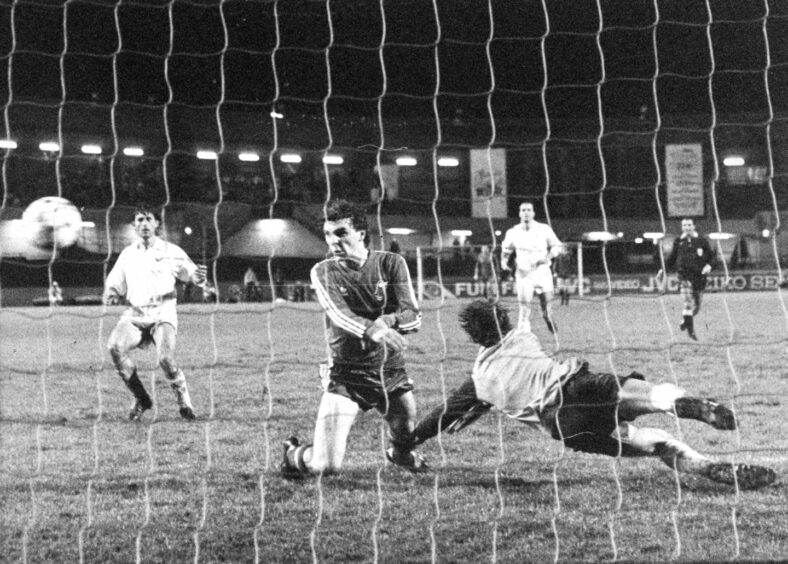
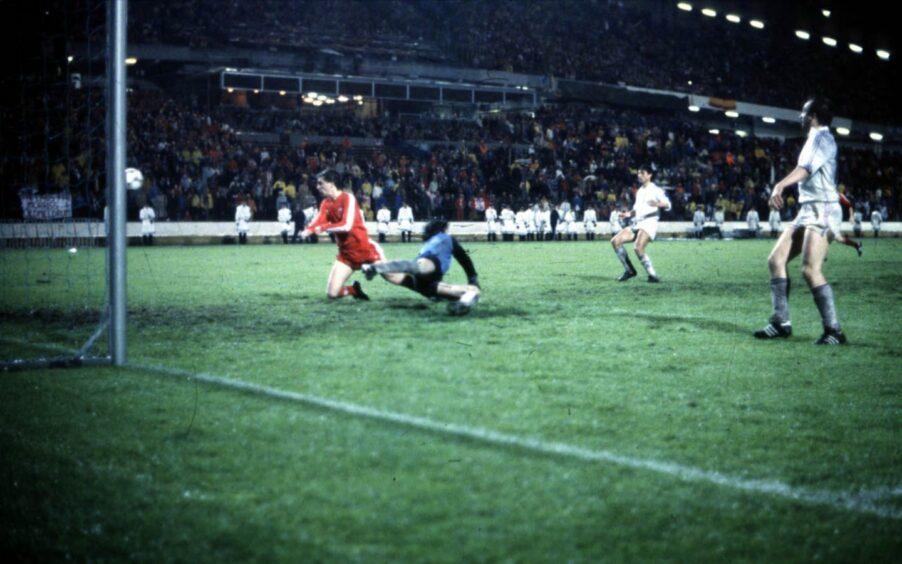
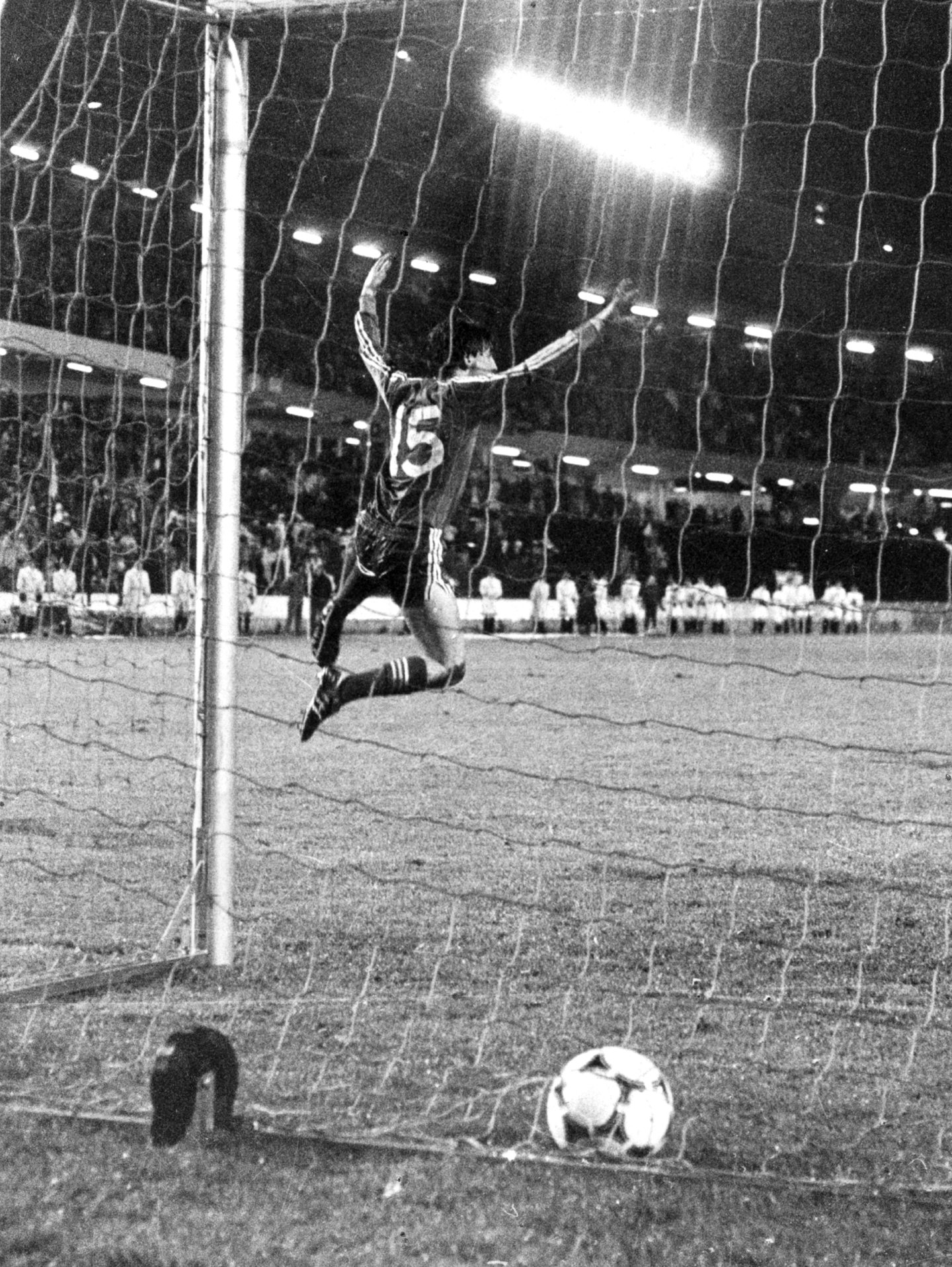
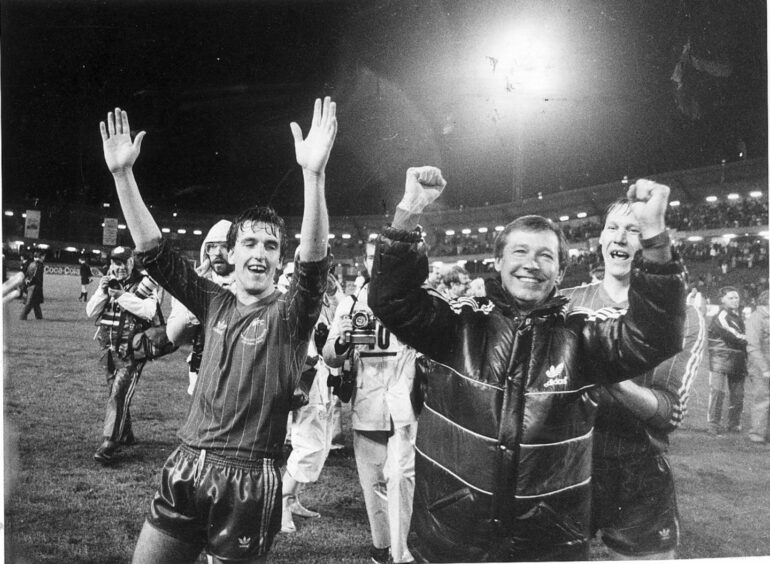
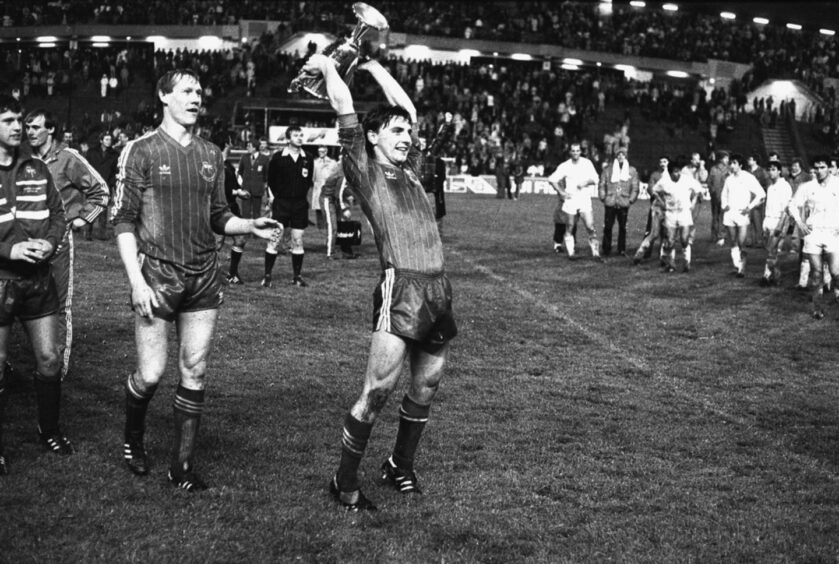

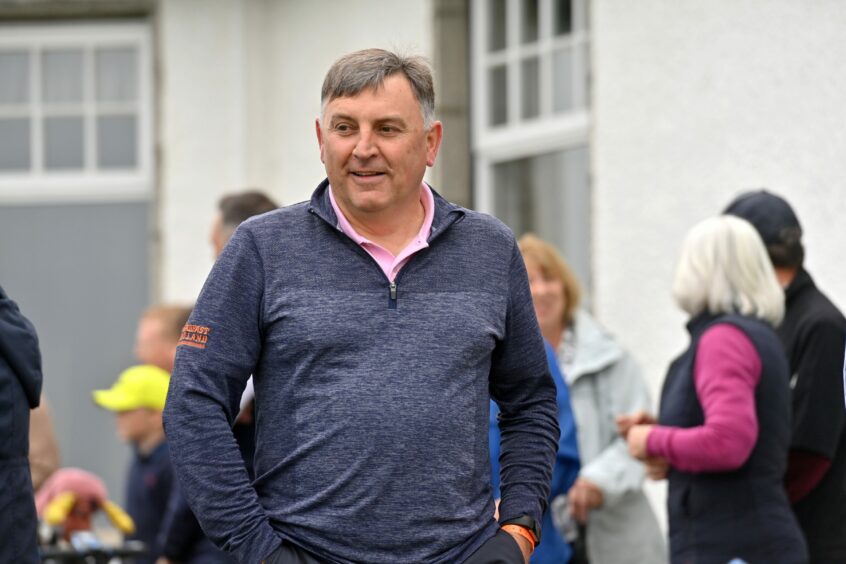
Conversation